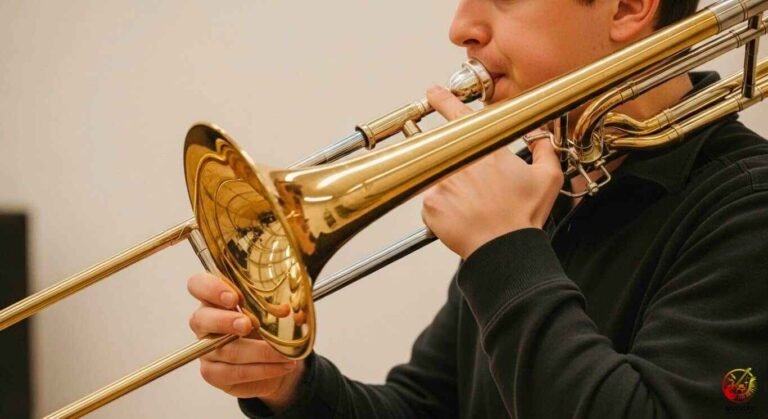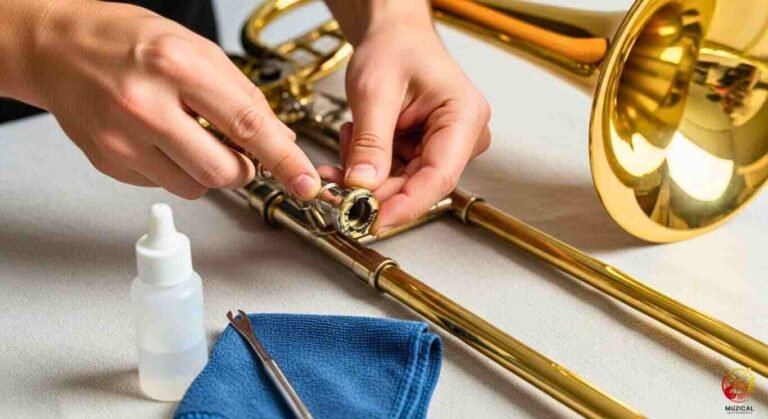How to Avoid Fatigue in Trombone Embouchure: A Complete Guide
Fatigue in trombone embouchure can stop you from playing well and enjoying music. When your lips, jaws, facial muscles get tired, your sound may falter, your high notes may crack, and your endurance drops.
You will learn how to prevent fatigue in trombone embouchure by knowing its causes, spotting the early signs, using good technique, and planning practice smartly.
This article shows you what habits to build, what mistakes to avoid, and how to recover when fatigue in trombone embouchure sets in.
You’ll also get tools, tips, and routines to protect your embouchure, strengthen it, and keep it healthy.
What is fatigue in trombone embouchure and why does it happen?
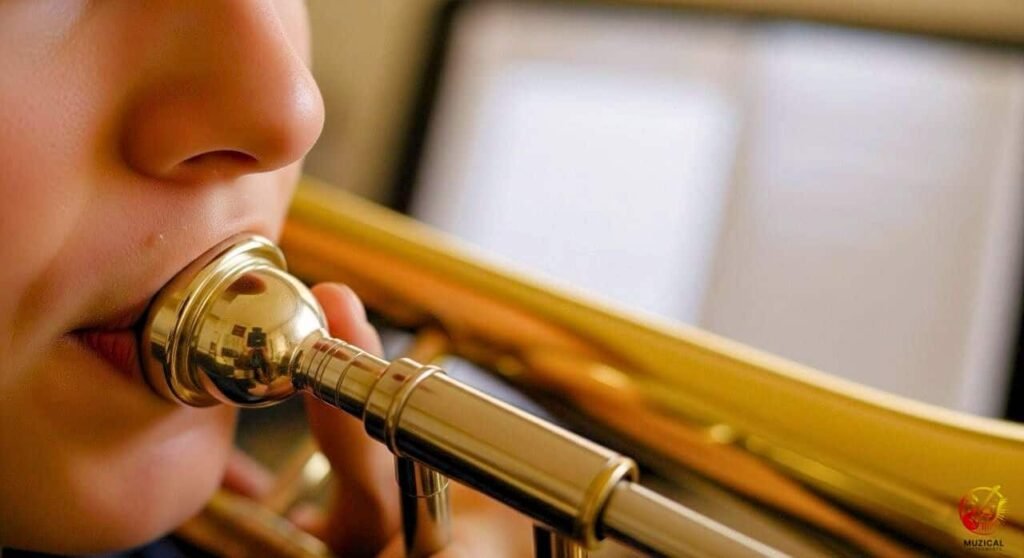
Many trombone players ask: What exactly causes fatigue in trombone embouchure?
Fatigue in trombone embouchure means that the muscles around your lips, cheeks, jaw, and face feel weak, sore, or unable to respond well. This happens because those muscles are small, work hard, and often are used too much, too fast.
If you push your range, volume, or speed without warming up, your lip vibration may suffer. You may press the mouthpiece too tightly. Your airflow or breath support may be weak. Your posture may be bad, slouched back, hunched shoulders, neck tilted. All those add strain.
There is a condition called embouchure overuse syndrome which shows these problems: lip swelling, lip pain, loss of control, weak sound, endurance issues. Also, embouchure collapse can result if fatigue builds up without recovery.
Example: You try to practice a high register piece without warming up. Lips get sore after 10 minutes. Tone becomes airy. That’s early fatigue in trombone embouchure.
How can you tell the difference between fatigue, overuse, and embouchure collapse?
Players often wonder: Is this just tired lips, or is it more serious?
| Symptom | Likely Cause | What to Watch |
|---|---|---|
| Lips feel tired after practice, minor soreness | Normal fatigue | Goes away after short rest, sound stays decent |
| Pain, swelling, tone weakens, high notes fail | Overuse syndrome | Symptoms persist more than 1-2 days, volume drops, control weakens |
| Tone collapse, loss of range, embouchure slips even in easy pieces | Embouchure collapse | Requires serious rest or rehab; may feel like lip muscles no longer obey your command; high register disappears |
Also check for embouchure dystonia, a rare neurological issue. It’s different: it causes involuntary muscle movement or tremor, not just fatigue. But most cases are fatigue, overuse, or collapse.
What practice methods reduce fatigue in trombone embouchure?
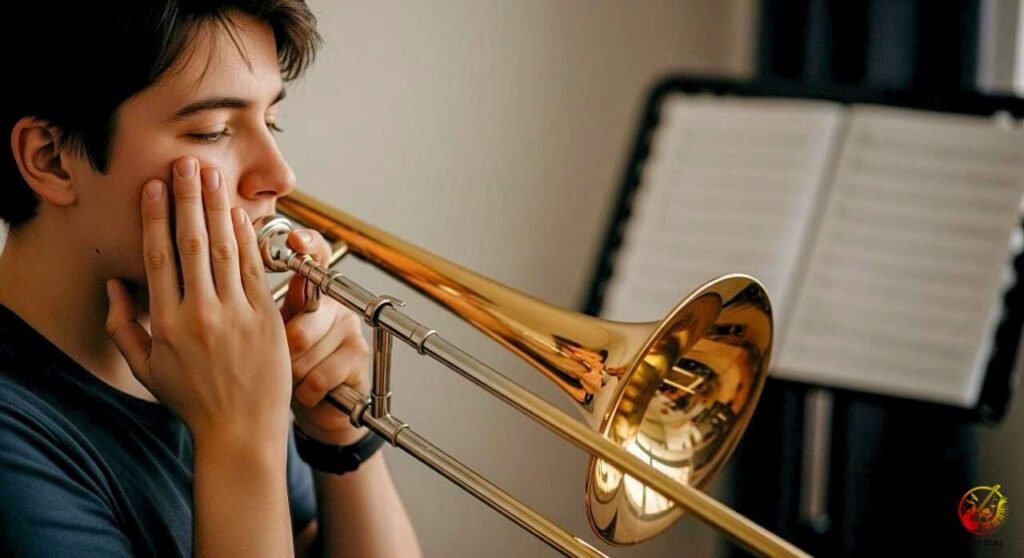
Many ask: What can I do in my daily routines so I don’t get fatigue in trombone embouchure?
Here are proven methods:
Warm ups
Start with soft long tones, lip slurs, low register work. Let your lips, facial muscles, jaw wake up slowly. This prepares vibration, airflow, embouchure alignment.
Use shorter sessions + rest
Instead of one long 2 hour practice, break it into chunks. E.g., 30 minutes practice, then 10 minutes rest. Rest gives facial muscles and the orbicularis oris muscle time to recover.
Air support and breath control
Use diaphragm breathing. Take deep breaths, use steady airflow. If you try to force high notes by tight lips or jaw, fatigue in trombone embouchure increases.
Limit mouthpiece pressure
Pressing the mouthpiece too hard seems helpful but actually kills endurance. Use just enough pressure for seal and tone. Too much pressure makes lips fatigue fast.
Maintain good posture
Hands, arms, shoulders, neck, back all matter. If your back is collapsed, air path is blocked. If your head tilts too far, jaw gets tense. Good posture helps airflow and lowers fatigue risks. Related concept: torso alignment in brass technique.
Varied practice
Mix loud/soft, high/low, slow/fast. That balances muscular work. Don’t always push high range or loud volume.
Use tools
Embouchure trainers or lip buzzing tools help you train without full trombone pressure. They build strength in safer conditions.
Use rest and recovery days
On some days, play lightly or stop playing. Let lips heal. That prevents overuse turning into serious fatigue or collapse.
What mistakes make fatigue in trombone embouchure worse?
People often ask: What am I doing wrong that causes fatigue in trombone embouchure faster than others?
- Smiling or pulling mouth corners too much. This changes how lips meet the rim; introduces unnecessary tension.
- Using too high a dynamic level too soon. Large volume requires more lip, jaw, facial support. If you’re not ready, fatigue comes sooner.
- Weak or shallow breathing. Chest breathing or breathing shallowly forces lip muscles and tongue to compensate. That causes strain.
- Bad mouthpiece placement or mismatch. If your mouthpiece is too big/small, or sits badly on lips / teeth, vibration isn’t efficient. You’ll use more force, pressure.
- Poor slide and posture alignment. When you twist or lean, one side of your face might take extra load. Neck or jaw tension adds to lip fatigue.
- Ignoring symptoms. If lips are sore, tone deteriorating, or high notes inconsistent yet you keep pushing fatigue in trombone embouchure worsens into overuse syndrome or collapse.
How do professionals recover when fatigue in trombone embouchure happens?
Another frequent question: I already feel fatigue in trombone embouchure, what can I do immediately to recover?
Here are recovery steps:
- Stop heavy playing. Use “light work”: gentle long tones, soft dynamics, no pushing high register.
- Use moist heat before playing to relax facial muscles; ice or cold compress after playing to reduce swelling. This helps overuse symptoms.
- Avoid changing mouthpiece or equipment suddenly just because you’re tired. Equipment changes can confuse embouchure placement and make recovery harder.
- Seek feedback. A teacher, embouchure coach, or clinician can observe your form, breathing, jaw, lip placement and suggest adjustments.
- Be patient. Recovery from overuse or early collapse can take time. It may take weeks. Some players keep notes on fatigue, pain, swelling to track progress.
Expert Insights & Pro Tips
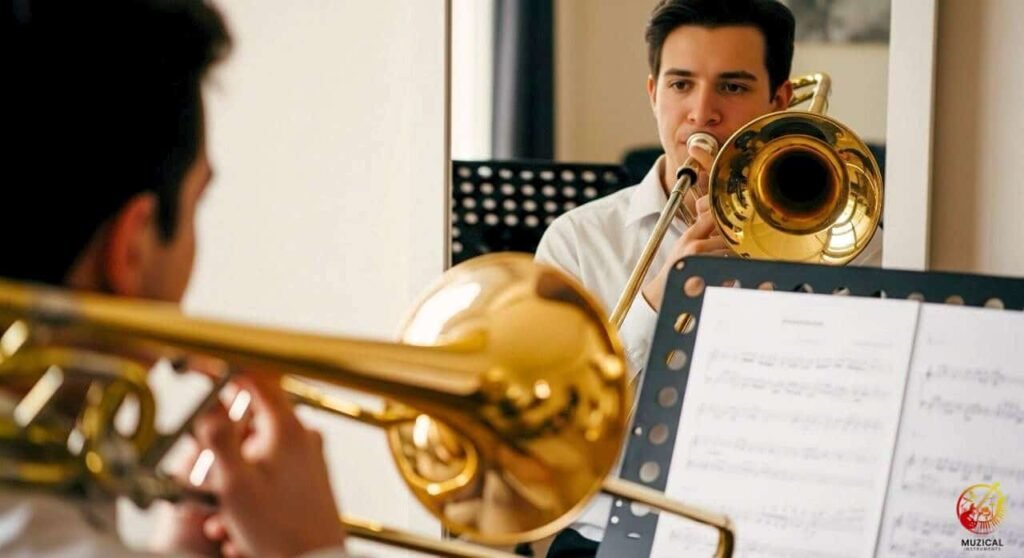
Here are some extra tips from experienced trombonists and embouchure specialists:
- Pro Tip: Start each practice with 5-10 minutes of buzzing on mouthpiece only. This warms the lips and teaches vibration without the full weight of the instrument.
- Expert Insight: Use a mirror or video to watch jaw, face, mouthpiece angle. Tiny tilt or twist may cause uneven strain.
- Pro Tip: Build endurance gradually. Don’t try to double practice time overnight. That often causes fatigue in trombone embouchure, not improvement.
- Insight from clinics: Some embouchure specialists (like Marcus Reynolds) teach “lip structure conditioning” and “pivot motion” to help maintain embouchure shape as you go higher in range.
Final Thoughts on Your Embouchure Health
Fatigue in trombone embouchure comes when your lips, jaw, face, breathing or posture are overloaded. You can avoid it by warming up, using good posture, reducing mouthpiece pressure, balancing practice with rest, and using training tools. Mistakes like pushing when tired or using bad form make things worse.
Action steps for you now:
- Tomorrow, try a warm up routine that begins with long tones and warms your lips without pushing high register.
- Keep a fatigue journal: write how your lips feel during and after each practice.
- Schedule rest days or active rest (playing softly) into your week.
Remember: protecting your embouchure today means a more stable tone, longer range, less pain tomorrow. Fatigue in trombone embouchure doesn’t have to hold you back.
FAQ: How to Avoid Fatigue in Trombone Embouchure
1. Why do my lips hurt after playing the trombone?
Your lips hurt because the small muscles that form your embouchure are tired, just like your legs would be after running. This is usually caused by practicing for too long without breaks, pressing the mouthpiece too hard against your face, or not using enough air support. A little tiredness is normal, but sharp pain or constant soreness means you need to rest and check your technique.
2. How long does it take to build trombone endurance?
Building endurance is a slow and steady process. There’s no magic number, but with consistent, smart practice (around 30-45 minutes a day with breaks), you’ll start to notice a real difference in a few weeks. It can take several months to a year to build up really solid stamina. The key is consistency, not cramming long hours of practice in.
3. Is it bad to play trombone with tired chops?
Yes, it’s a bad idea to keep playing when your chops are already very tired. When you’re fatigued, you start to use bad habits, like pressing too hard, to get the notes out. This can lead to injury and actually make your endurance worse over time. If your embouchure feels exhausted, the best thing you can do is stop, do a gentle cool down, and rest.
4. Can a different mouthpiece reduce fatigue in my trombone embouchure?
A different mouthpiece can sometimes help, but it’s not a magic fix. A mouthpiece that is a poor fit for you can make you work much harder than you need to, causing fatigue. However, the most common causes of fatigue are poor technique and lack of conditioning. Before spending money on a new mouthpiece, focus on improving your breath support and reducing pressure.
5. How can I make my high notes less tiring to play?
High notes become tiring when you try to force them out with mouthpiece pressure instead of fast, focused air. To make them easier, think about using a narrow, quick stream of air, like you’re blowing through a small straw. Practice gentle lip slurs going into the upper register to build strength and control without mashing the horn into your face.
6. Is it normal for my lips to be swollen after playing?
A little bit of puffiness after a long, hard playing session can be normal, but it should go away quickly. If you have significant swelling that lasts for hours or into the next day, it’s a sign that you are pressing way too hard and possibly damaging the muscle tissue. You should take a day or two off to let them recover fully.
7. How often should I practice to build a strong embouchure?
Consistency is more important than length. Practicing for 30 minutes every day is much better than practicing for three hours once a week. Daily practice builds muscle memory and gradually strengthens your embouchure without overworking it. Always remember to include a warm up and cool down in your daily routine.


